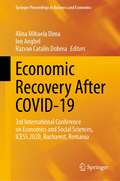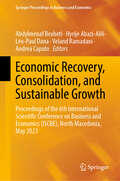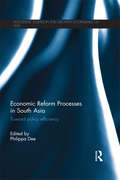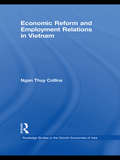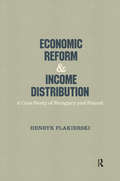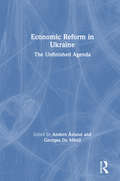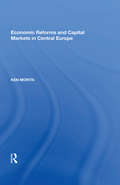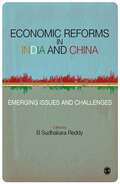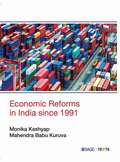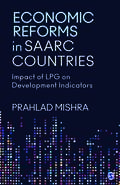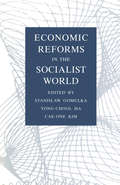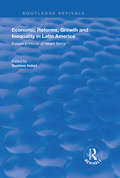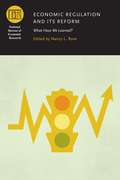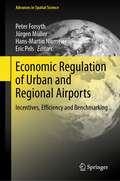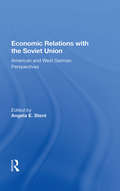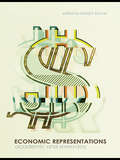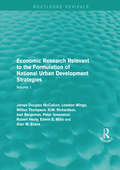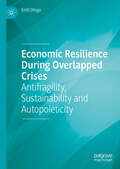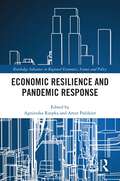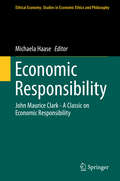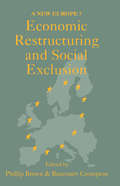- Table View
- List View
Economic Recovery After COVID-19: 3rd International Conference on Economics and Social Sciences, ICESS 2020, Bucharest, Romania (Springer Proceedings in Business and Economics)
by Alina Mihaela Dima Ion Anghel Razvan Catalin DobreaThese proceedings constitute a selection of best papers from the 3rd International Conference on Economics and Social Sciences, Innovative Models to Revive the Global Economy, ICESS 2020, held in Bucharest, Romania, in October 2020.This book is a collection of research findings and perspectives related to recent economic challenges determined by the global crisis due to COVID 19, led by the set of improvements and changes in the economic, societal, and technological structures and processes towards the effort of reaching the sustainability goals. During a crisis, countries, and businesses must respond promptly to ensure survival. They need to rethink social contracts, redefine work and consumption, mobilize resources at speed and scale, and at the same time rethink patterns from global to local. The innovative models presented in this book aim to ensure simultaneous economic development, social development, and environmental protection, to achieve a higher quality of life for all people, and protect all living beings and the planet.
Economic Recovery, Consolidation, and Sustainable Growth: Proceedings of the 6th International Scientific Conference on Business and Economics (ISCBE), North Macedonia, May 2023 (Springer Proceedings in Business and Economics)
by Léo-Paul Dana Veland Ramadani Abdylmenaf Bexheti Andrea Caputo Hyrije Abazi-AliliThis book presents carefully selected chapters from the proceedings of the 6th International Scientific Conference on Business and Economics (ISCBE),Tetovo, North Macedonia, which took place in May 2023. The chapters address a wide range of areas relevant to contemporary business and economics issues such as economic shocks, high inflation, energy crisis, COVID-19, growth prospects, economic forecast, labor market, gender inequalities, migration, entrepreneurship, and family businesses, firm development and innovations, technological transformation, etc. Researchers learn about the latest studies that discuss emerging challenges and perspectives of business and economics in the perspective of post-crisis economic recovery, consolidation, and stability.
Economic Reform Processes in South Asia: Toward Policy Efficiency (Routledge Studies in the Growth Economies of Asia)
by Philippa DeeWhile South Asia’s economic reform initiatives of the last two decades were often born in crisis, this alone does not account for their occurrence. This book looks at the processes and institutional arrangements behind these reforms, and analyses what lessons can be learnt about how South Asia can improve its policy efficiency. The book develops ideas about how to overcome the political restraints to reform by drawing on recent theories of political economy and policy learning. It tests these ideas against authoritative case studies of actual reform initiatives in South Asia, which illustrate processes and institutional arrangements that have helped South Asian governments to sustain reform efforts, even in the absence of a strong political base. This offers valuable lessons for the global economy as it moves into a phase of rebalancing, with the structural adjustments that this will require. The book goes on to identify weaknesses that could be addressed by South Asian national governments and regional forums. It is an important contribution to studies on South Asian Politics and International Political Economy
Economic Reform and Employment Relations in Vietnam (Routledge Studies in the Growth Economies of Asia)
by Ngan Thuy CollinsThe transformation of the Vietnamese economy from socialist planning to a market economy has led to Vietnam having one of the fastest economic growth rates in the world; and to also to Vietnam engaging much more with the international economy, joining the World Trade Organisation in 2006. This book fills a significant gap by surveying the economic reforms in Vietnam, where most studies have concentrated on other ‘young tiger’ economies. In particular it discusses the transformation of employment relations which have been a key part of the reforms and a necessary pre-condition to WTO membership. It examines the nature of employment reforms, analyses the motivation behind new policy initiatives and examines the detail of reforms in a range of business enterprises, reporting on extensive original research. Throughout it shows how several key forces have interacted – globalisation, government political interests, national cultural norms, market, managerial ideology and the special characteristics of particular firms – to produce a particular Vietnamese brand of post-communist market economy. Overall, this book illuminates the how employment relation practices are formed in transitional economies, and more broadly the economic and political transformation of socialist economies in the context of the global market.
Economic Reform and Income Distribution: Case Study of Hungary and Poland
by Henryk FlakierskiFirst Published in 2017. Routledge is an imprint of Taylor & Francis, an Informa company.
Economic Reform in China
by David Burton Wanda Tseng Hoe Ee Khor Kalpana Kochhar Dubravko MihaljekChina's economic performance hs been remarkable since the the reform process began 15 years ago. Notwithstanding the achievements that have been made, a number of serious problems remain. This papers discusses the current reform program and the effors being made to overcome the structural impediments to growth.
Economic Reform in India
by Nicholas C. Hope Anjini Kochar Roger Noll T. N. Srinivasan Nicholas C. Hope Anjini Kochar Roger NollThe essays in this volume are written by leading economists working on the Indian economy. They collectively emphasize the importance of policies and institutions for sustained growth and poverty reduction, stressing that the success of sector-specific policies is vitally dependent on the nature of markets and the functioning of institutions such as those charged with regulating and overseeing critical sectors. Individual contributions assess the role of Indian government policy in key sectors and emphasize the policies required to ensure improvements in these sectors. The first section discusses aspects of the macro economy; the second deals with agriculture and social sectors; the third with jobs and how labor markets function in agriculture, industry and services; and the fourth with infrastructure services, specifically electricity, telecommunications and transport. The essays are drawn from the most influential papers presented in recent years on Indian economic policy at the Stanford Center for International Development.
Economic Reform in Ukraine: The Unfinished Agenda
by Anders Aslund Georges De MenilUkraine may have taken a "gradualist" approach to economic reform, but the results have been no better than in Russia. The editors have assembled the leading specialists on the Ukrainian economy, including officials from major Ukrainian and international economic institutions, to outline the major problems of the economy, analyze the initial phases of economic reform in Ukraine, assess their outcomes, and chart the way forward.
Economic Reforms and Capital Markets in Central Europe
by Ken MoritaIs the economic reform of Central Europe influenced by or an influence upon capital markets? Where does globalization fit in? Ken Morita's pioneering work investigates the relationship between the systemic transition of Central European economies and capital markets, in particular the commodity futures markets and speculation.
Economic Reforms in India and China: Emerging Issues and Challenges
by B. Sudhakara ReddyThis first-of-its-kind collection summarizes current trends in the economic scenario of India and China in the backdrop of globalization and outlines not only the goals and strategies for development but also the policies to achieve those goals. It provides a frame of development by addressing various issues such as how to expand the services sector, how to keep pace with the incredible growth of the manufacturing sector and how to ensure widest possible diffusions of the huge economic gains. Economic Reforms in India and China: Emerging Issues and Challenges presents the latest data and appraises issues pertaining to the economic reforms of India and China—two of the major contenders for global power. The two countries have followed different paths to economic growth and yet both have emerged as fast growing economies. Thus, it is interesting to know the comparative views of the growth stories of the two countries to see where they are heading. The volume brings together some of the most influential scholars in development economics from India and China. They address issues that include the governance as well as the historical perspective of globalization, poverty, inequality of income and the potential for conflict, agriculture, WTO and its relation with trade prospects, and the nature and characteristics of institutions and markets. The compilation is a significant addition to the existing literature on development and reforms, as it puts forward in a single volume, a vast range of academic concerns—those of economists, sociologists, policy makers, agricultural scientists and research scholars.
Economic Reforms in India since 1991
by Monika Kashyap Mahendra Babu KuruvaEconomic Reforms in India since 1991 provides a compact overview of India's economic reforms in financial, trade and agricultural sectors, and the impact of these policies on India's economy.The book is divided into three parts. Part A, dealing with financial sector reforms, provides an outlook of the financial system and its working with a detailed discussion of trends and progress of India's financial system. Part B discusses the trade policy reforms. It provides a bird's-eye view of the developments in India's external sector from 1950 - 2016. Part C deals with agricultural reforms with a status report on pre- and post-liberalization agriculture policies. Major reforms in the agricultural sector, including major schemes, their impact and progress, and future prospects have been discussed at length. This book would serve as a companion for students of economics, management, public policy as well as political economy, and cater to the needs of both undergraduate and postgraduate students. Key Features: • Concise, well-rounded coverage of financial, trade and agricultural policy reforms in one volume. • Easily comprehensible comparison between pre and post-liberalization reforms. • Clear and relatable text with examples to showcase the background and implications of policy reforms on the Indian economy. • Chapters aided by recent data, illustrations, self-review exercises and so on.
Economic Reforms in Kazakhstan, Kyrgyz Republic, Tajikistan, Turkmenistan, and Uzbekistan
by International Monetary FundA report from the International Monetary Fund.
Economic Reforms in SAARC Countries: Impact of LPG on Development Indicators
by Prahlad MishraEconomic Reforms in SAARC Countries presents a cross-country comparison of development indicators in the SAARC countries with respect to the recent Liberalization, Privatization and Globalization (LPG). Presenting an empirical analysis, the book brings in the theoretical background relating to the growth of public expenditure as articulated by Adolf Wagner and other researchers in the 19th and early 20th centuries along with the Displacement Effect Hypothesis as advanced by Peacock and Wiseman in the mid-20th century. This book re-examines these theories and the views of researchers with respect to the changes in economic policies and studies the relevance of these in the present context. The book re-interprets the theories in the light of the impact of policy changes with time series analysis highlighting the changes in the structure of the estimated equation using dummy variables. The book discusses the differential growth of a few macro-economic variables in the SAARC countries with respect to time in the pre- and post-LPG period. It examines the determinants of development indicators in the post-LPG period identifying the most important determinants.
Economic Reforms in the Socialist World
by Stanislaw,etc, GomulkaFirst Published in 1990. Routledge is an imprint of Taylor & Francis, an Informa company.
Economic Reforms, Growth and Inequality in Latin America: Essays in Honor of Albert Berry (Routledge Revivals)
by Gustavo IndartOriginally published in 2004. Growth, income distribution, and labour markets are issues of pivotal importance in the Latin American context. Examining unique theoretical issues and the empirical evidence, this book provides a critical analysis of the key elements of income distribution determinants, labour market functions, trade policies, and their interrelations. As the advance of globalization becomes seemingly unstoppable, this book provides an important reappraisal of the impact of this new phenomenon, and in particular, the pernicious impact it may have on income growth and distribution. The key objective of the volume is to integrate more fully the analysis of trade and labour market economists, in order to better understand the labour market and income distribution implications of globalization and international integration. Forty years after the early calls to appropriately investigate the micro foundations of macroeconomics, the separation of the two at the policy level is more damaging than ever before - particularly for developing regions; this volume therefore makes an important contribution at the theoretical and policy levels by bringing together macroeconomic and microeconomic analyses.
Economic Regulation and Its Reform: What Have We Learned?
by Nancy L. RoseThe past thirty years have witnessed a transformation of government economic intervention in broad segments of industry throughout the world. Many industries historically subject to economic price and entry controls have been largely deregulated, including natural gas, trucking, airlines, and commercial banking. However, recent concerns about market power in restructured electricity markets, airline industry instability amid chronic financial stress, and the challenges created by the repeal of the Glass-Steagall Act, which allowed commercial banks to participate in investment banking, have led to calls for renewed market intervention. Economic Regulation and Its Reform collects research by a group of distinguished scholars who explore these and other issues surrounding government economic intervention. Determining the consequences of such intervention requires a careful assessment of the costs and benefits of imperfect regulation. Moreover, government interventions may take a variety of forms, from relatively nonintrusive performance-based regulations to more aggressive antitrust and competition policies and barriers to entry. This volume introduces the key issues surrounding economic regulation, provides an assessment of the economic effects of regulatory reforms over the past three decades, and examines how these insights bear on some of today’s most significant concerns in regulatory policy.
Economic Regulation and Its Reform: What Have We Learned? (National Bureau of Economic Research Conference Report)
by Nancy L. RoseThe past thirty years have witnessed a transformation of government economic intervention in broad segments of industry throughout the world. Many industries historically subject to economic price and entry controls have been largely deregulated, including natural gas, trucking, airlines, and commercial banking. However, recent concerns about market power in restructured electricity markets, airline industry instability amid chronic financial stress, and the challenges created by the repeal of the Glass-Steagall Act, which allowed commercial banks to participate in investment banking, have led to calls for renewed market intervention. Economic Regulation and Its Reform collects research by a group of distinguished scholars who explore these and other issues surrounding government economic intervention. Determining the consequences of such intervention requires a careful assessment of the costs and benefits of imperfect regulation. Moreover, government interventions may take a variety of forms, from relatively nonintrusive performance-based regulations to more aggressive antitrust and competition policies and barriers to entry. This volume introduces the key issues surrounding economic regulation, provides an assessment of the economic effects of regulatory reforms over the past three decades, and examines how these insights bear on some of today’s most significant concerns in regulatory policy.
Economic Regulation of Urban and Regional Airports: Incentives, Efficiency and Benchmarking (Advances in Spatial Science)
by Peter Forsyth Jürgen Müller Hans-Martin Niemeier Eric PelsThis book offers new insights into the theory and practice of economic airport regulation. In light of recent developments in aviation markets and policy, and the debate on airport regulation and benchmarking, it offers case studies on various aspects of economic regulation of city and regional airports. Written by experts in the field, the volume features contributions on the theory of regulation and benchmarking, as well as case studies on recent experiences in Europe and Latin America.This book is divided into three parts: Part I provides the theoretical background for the study of airport regulation and regulatory systems. Competition at airports is discussed, as are common forms of regulation and potential pitfalls. Part II addresses benchmarking, as benchmarking is often applied as an input to the regulatory process. Although benchmarking is necessary, reviews of how benchmarking is applied in the literature and in practice show that improvements can be made. Part III provides case studies on real-world examples.Addressing the question of whether and how European airport regulators set incentives for efficiency, and how benchmarking is used in the regulatory process, this book is an important contribution to the development of the transport industry in Europe and Latin America. It will appeal to scholars and students in transport economics, regional economics and related fields, as well as to practitioners and policy makers in the transport industry.
Economic Relations With The Soviet Union: American And West German Perspectives
by Angela E. StentIn recent years, the United States and the Federal Republic of Germany have disagreed sharply over the politics and economics of East-West relations. This book examines the political and economic premises behind American and West German approaches toward East-West commerce and analyzes the degree to which views differ. The contributors, a mix of Ge
Economic Representations: Academic and Everyday (Routledge Frontiers Of Political Economy Ser.)
by David F. RuccioWhy is there such a proliferation of economic discourses in literary theory, cultural studies, anti-sweatshop debates, popular music, and other areas outside the official discipline of economics? How is the economy represented in different ways by economists and non-economists?In this volume, scholars from a wide variety of disciplines and countrie
Economic Research Relevant to the Formulation of National Urban Development Strategies: Volume 1 (Routledge Revivals)
by Robert Healy Alan W. Evans Edwin S. Mills H.W. Richardson James Douglas McCallum Lowdon Wingo Wilbur Thompson Joel Bergsman Peter GreenstonOriginally published in 1971, this volume contains papers invited for a conference on economic research relevant to national urban development held in September of the same year. The conference pulled together researchers from both the United Kingdom and the United States who were interested in economic research on key issues of both countries’ management of their urban areas. Papers are varied from those in the early stages of research to those whose research has been completed and all provide an insight into the increase of urbanisation present in the first world. This title will be of interest to students of environmental studies and economics.
Economic Resilience During Overlapped Crises: Antifragility, Sustainability and Autopoieticity
by Emil DingaThis book provides an analytical framework for understanding economic crisis and the mechanisms that underpin them. It shows the various ways in which economies can face crisis and the unique impacts that occur when multiple crises happen at the same time, highlighting how crises are not isolated, but part of a wider system of crises. By examining the ways in which this cycle can be disrupted by economic robustness, resilience, and sustainability, methods for breaking this cycle are presented, alongside an outline for the redesign of economic systems to protect against future crises.This book offers insight into the creation of sound and resilient economies. It will be relevant to students, researchers, and policymakers interested in economic crisis and economic policy.
Economic Resilience and Pandemic Response (Routledge Advances in Regional Economics, Science and Policy)
by Agnieszka Rzepka Artur PaździorThe COVID-19 pandemic upended our social and economic lives. Lockdowns forced firms to implement health and safety protocols, employees to work from home, and businesses of all sorts to close. Even as lockdowns eased, the landscape of work, commerce, leisure, and education was irrevocably transformed. While in many ways life has returned to normal, many of the changes wrought by the pandemic are here to stay. This book presents research on these transformations, examining how the economy and society were impacted. Organizing different aspects of the pandemic into individual chapters, this book examines issues such as financing structures, liquidity, profitmaking, investment, financial security, and market valuation, among other topics. Reflecting deep research as well as an extensive review of the literature, each chapter provides not just theoretical and empirical insight but also a set of policy recommendations to insure against similar crises in the future. Encompassing a range of case studies, it outlines strategies for dealing with the manifold challenges of today’s business environment. This book showcases the development of particular sectors over the course of the pandemic, and as such, serves as a valuable study, enabling a comprehensive analysis of topics ranging from economics to social dynamics. It provides a deep understanding of this unique period's wide-ranging challenges and transformations and underscores the central economic concern of the pandemic's effect on economic security, a topic discussed throughout several chapters. Furthermore, it includes a discussion on the broader scope of “polycrisis". This volume was designed to appeal to a wide range of readers interested in economics, management, regional studies, and related fields.
Economic Responsibility
by Michaela HaaseJohn Maurice Clark's article "The Changing Basis of Economic Responsibility," published in the Journal of Political Economy, is the topical starting point for all scholars interested in economic responsibility and responsible economic action. John Maurice Clark (1884-1963), a leading institutional economist, reflected on the consequences of the social and economic change taking place at the turn of the last century for the responsibility of individuals, businesses, and corporations and called for the development of an economics of responsibility. This book contains in-depth articles by scholars from within and beyond economics who continue on the Clark project or address actual problems calling for economic responsibility in the light of his approach.
Economic Restructuring And Social Exclusion: A New Europe? (Routledge Library Editions: British Sociological Association Ser. #19)
by Phillip Brown Rosemary CromptonThis book is intended for undergraduate and postgraduate courses in social structure and political sociology as well as academic sociologists and libraries. It should have significant appeal to researchers and students in European studies and others interested in European integration.
